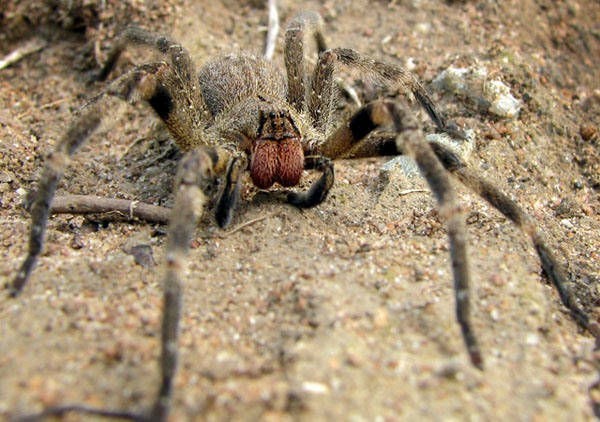
A man was left stunned when he discovered a venomous Brazilian spider in a packet of bananas he bought at a supermarket. The deadly spider was amongst the fruit after 52-year-old Neil Langley went to the Asda supermarket in the West Midlands.
Langley only noticed the brown-coloured arachnid when he reached into his lunch later at work at the Department of Work and Pensions.
According to Bristol Post, Langley's colleagues called the RSPCA, which identified the creepy crawly as the infamous Brazilian wandering spider, or Phoneutria. The spider, which has distinctive red jaws and can grow to five inches, was then donated to Bristol Zoo.
Langley told reporters that an office came to collect the spider and took it to Bristol Zoo. The administrative assistant from Bilston, Wolverhampton believes the spider was accidentally packaged with the fruit in Costa Rica.
"I'm not scared of spiders - I actually quite like them - but the thought of having one of the world's deadliest creatures so close to you is a bit unnerving," he said.
The wandering spider's bite can cause priapism in men, meaning the penis remains painfully erect for several hours.
The bite can led to intense pain, nausea, blurred vision, convulsions, vertigo and sweating. Bitten humans, particularly children, are at risk of dying hours after being bitten but there is an effective anti-venom available in Brazil.
"When it came to lunch time, I opened up the packaging, and noticed it on one of the bananas," he said. "I was taken aback at first, because it didn't look like right - it looked like a spider, but it was brown and almost see-through."
Asda offers reassurance
"I didn't really think that it was threatening, but some of my colleagues started to get a bit concerned about it," he said.
He continued: "Eventually, I went into an hour-long meeting, and by the time I'd come out an animal-loving colleague of mine had phoned up the RSPCA, who said it must have been a Brazilian wandering spider.
"We were all a bit baffled by it, the thought that such a rare spider could have just been sat on one of my bananas like that. I was lucky that it hadn't crawled out at home or in my work bag, otherwise who knows where it could have got to."
"We sell around one billion bananas every year and each and every one is washed, sprayed and manually checked for quality and stowaways before being transported to the UK," a spokesperson for Asda said.
"We'd like to reassure all our customers that the chance of finding a spider is incredibly low and it's even less likely that a tropical spider could survive outside of their warm climate."
